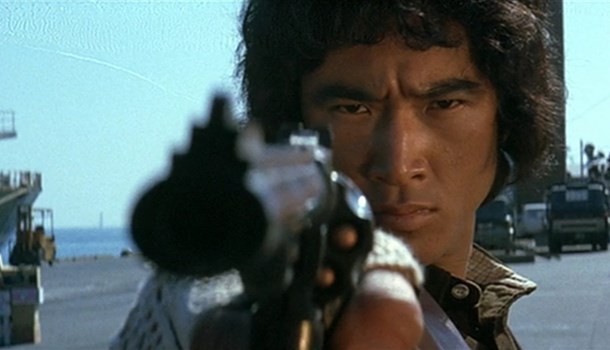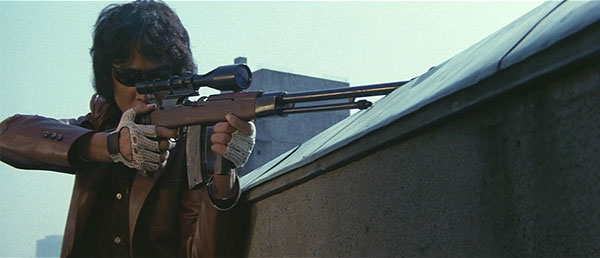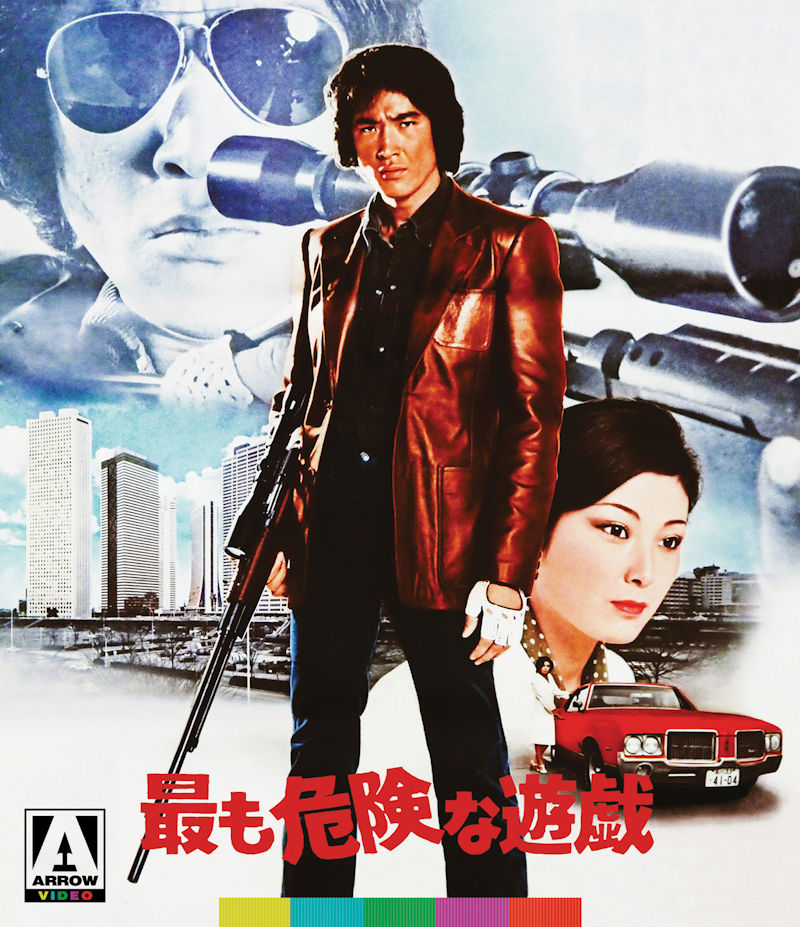
Written by Richard Durrance on 10 Jun 2023
Distributor Arrow Films • Certificate 18 • Price £18
Sadly, having died young after starring in Ridley Scott’s Black Rain and the second of Seijun Suzuki’s Taisho Trilogy, Kagero-Za, Yusaku Matsuda was something of a mystery to me even having seen both films (admittedly Matsuda in these films vs Kagero-Za are poles apart); it’s also no surprise knowing how lazy I am that’d I’d not come across Toru Murakawa's The Most Dangerous Game (1978), The Killing Game (1978) or The Execution Game (1979) before, all starring Yusaku Matsuda as master-assassin Shohei Narumi.
Where to start? Well, obviously with The Most Dangerous Game.
Assassin Narumi is hired by the head of the Tonichi Group to kill a corporate fixer, Adachi (Bontaro Miake), who is working for a rival company to take a major contract from them by kidnapping and killing Tonichi executives, including the Tonichi head’s own son-in-law.
Reading the title: The Most Dangerous Game, brings immediately to mind the 1932 film made on the sets of King Kong and during the lulls in filming of that cinematic classic; that film is a class act but this Most Dangerous Game has nothing to do with it, nor the 1924 short story of the same name, which by all accounts is one of the most anthologised stories of all times.
A shame really because if it had been it might have been a much better film.
Not that The Most Dangerous Game is a terrible film, but nor is it a classic waiting to be rediscovered. There is a lot wrong with it, and some of which you suspect may not be the director’s fault. The first half of the film struggles a lot under the weight of what seems to be a lot of cuts to the story, so that you end up pausing the film and asking yourself if you missed something. Not that the story ceases to make sense, rather plot elements just seem to be totally missed out: how does Narumi know about certain activities or even where he needs to be... suddenly he is just in the right place to kick ass (in this it is very reminiscent of the second Executioner film: Karate Inferno). This is discombobulating enough but it’s made worse by how Narumi is a little like Sonny Chiba’s protagonist in The Street Fighter films, in that he is surprisingly amoral; yet while Chiba had a certain dignity and a strand or two of integrity, Narumi in The Most Dangerous Game is at times a comic slacker, a rapist and mainly lacking in any form of characterisation whatsoever. Here the screenplay you think is at fault because it tries to cram in just about every possible thing it can without instead seeking any form of narrative purity.
By way of love interest, it throws Kyoko (Keiko Tasaka) at us, who at one point you know is going to fall for Narumi despite the fact that he has tied her up, raped her to elicit information and goad her lover on the phone into acting rashly. I can accept this in certain circumstances, that is not to say it is right, but from a psychological perspective (such as the destructive, drug-addled relationship in Kinji Fukasaku’s Graveyard of Honour, where the film's raw, violent brutal harshness makes the relationship that occurs have a touch of realness, while also being sad, deeply sad, almost tragic); here it seems all rote: Narumi needs a love interest and so... even if you accept what happens, arguably Kyoko is also a narrative incumbrance at best, and the film would have been better without her and instead focussed on Narumi as the lone killer with a job to do.
The story zips about, sometimes with little clarity, and always with an ending you see coming a mile away. And who are we meant to care about? Which parts of the story are we meant to find exciting? It’s hard to say because the story and characters and pretty flat, if not downright thin. I feel like the narrative is meant to be lean and mean and somehow for a 90-minute film it feels strangely woolly and unfocussed.
It’s true some of the action is exciting, though often it is let down by the sense of what is going on inbetween being so bloody flimsy. True Matsuda looks like he is capable of violence but the film cannot decide if he is a killing machine or else a human who if shot bleeds and feels pain. Sometimes he takes massive amounts of physical pain and barely a moment later seems capable of getting on his feet and fighting back whereas in another he’ll be shot and near death; this is not mentioning when he's in slacker-comic mode. It's all too incoherent in tone.
That said for a 90-minute film it does zoom by and when the action is at its best it works pretty well, but it’s hard not to feel that it's a bitter pill to swallow, with how women are treated in the film and the laziness of the storytelling.
Matsuda would become a star and here he does have a certain screen presence, but his character seems so loose, so unlikable, so transparently nothing that it’s hard to say if his performance is good, bad, or terrible, as he seems to have almost nothing to work with: occasionally he’s meant to be comic (such as the early Mahjong scene, which seems to have zero purpose), sometimes he’s hard as nails, often he’s abusing women. He jumps from pantomime to stony-faced; whether this was Matsuda’s choice or not who knows, but the whole thing is baffling.
Sadly, the stylish action just cannot make up for the films many shortcomings. Though what did intrigue me most was how some of the score sounded similar to that of Miyazaki's The Castle of Cagliostro. Ironic really as Cagliostro is a film that really shows us how to have an amoral protagonist that is engaging whilst also managing to weave an entertaining narrative.
So, what would the next film, The Killing Game, have to show me? Hopefully a film genuinely more focussed and with less unpleasant misogyny.

There are films like The Godfather and Star Wars, where the sequels are considered better than the original and thankfully here, the same is true.
Five years ago, Narumi killed the head of an organisation and disappeared. Yet he chose not to kill the two witnesses, the victim’s daughter, and his mistress, Misako (Yutaka Nakajima). Then, Narumi is brought into the middle of a yakuza war. Both women are now involved with yakuza in the midst of this war, which allows little honour or honesty and Narumi is stuck in a web of intrigue.
While an imperfect film, The Killing Game at least knows what it is about. An action thriller with an amoral assassin at the core. It’s much a leaner film and more coherent than the first, even if at 90-minutes arguably ten of those should have been shaved off to make it a tighter narrative. But you forgive it that because the narrative allows Matsuda’s character to actually (Shock! Horror!) make sense. Gone the misogynistic trapping of the first film (though the ending might suggest it to some but I would strongly disagree); here he’s not necessarily noble but Matsuda’s laconic performance – with the magnum it brings to mind Clint Eastwood – feels like it has a place in the story, whereas in The Most Dangerous Game honestly Matsuda wasn’t great but that was in part because the film couldn’t work out what the character was meant to be. Thankfully here there’s much needed and very welcome clarity.
The story, like the first film, won’t surprise you much, but it’s nowhere near as rote as the first. The presence of Kei Sato as one of the Yakuza heads, Katsuda, is definitely plus in the acting stakes, but it also helps immensely how Narumi relates to Misako as this leads to a genuinely surprising and effective ending. That said, the ending of the film is not the end, as there are some odd ‘humorous’ additions: one a sidekick of sorts Bunta, who seems to be there either to be in peril or else shout “Banzai!” a lot, and the least said about the epilogue the better - a comedic punchline you see coming a mile away and three-minutes of pure superfluity.
But that doesn’t matter too much because Matsuda’s screen presence as a leading man manages this time to paper over the cracks and as its core this is a decent picture. The action scenes follow the pattern of much of the first film, and are intriguing in how they are in many ways less about the action and more about Matsuda’s Narumi, especially one sequence where the focus is really on how he manages to infiltrate then exfiltrate a yakuza office. It’s all about how Narumi does it, the camera follows him and you sense his thought processes of survival by the way the camera moves either with him or to suggest where he is expecting trouble. Similarly, much of the shooting of guns take place out of our field of vision: Narumi viewed down the end of a hallway firing into a room but at who and want we cannot see. Then the camera may pan across to allow us to see the resultant violence but often not. Whether a stylistic conceit or a necessity of budget it doesn’t matter because it adds a curiously near-documentary feel to the gunfights, like you are witnessing it and makes it all the more engaging to watch.
And yes, as I said there’s the ending (I’m excluding the dire comedy epilogue), which may be divisive but reflecting on how the film opens, makes thematic sense and is shot in a striking manner. A good ending can really make a film stick in the mind. True, there were some aspects that could have been removed - really was the daughter of the murdered executive at the beginning of the film necessary? - arguably her character doesn’t come into the story enough to be more than another eventual victim of yakuza violence. But nevertheless, Matsuda has the chance to really flesh out Narumi and up the quality of the trilogy overall.
This leaves but one more excursion: The Execution Game and I hoped the upwards trajectory of the series would continue. I mean we’re watching an assassin at work, so the trilogy should go out not with a whimper but a bang.

If I said that how a film ends is important, also how one starts lingers in the mind. The Killing Game starts oh so very well. Almost immediately making me think, of all things, Shinya Tsukamoto’s Haze, as Narumi wakes up on the floor of a room. Dirty, confused. Toyed with by an unseen man, he’s put back to sleep only to wake up again to find a gun and maybe a way out, as Narumi is put through his paces and then given a task: to kill a highly skilled killer and take his place in the organisation.
And what a stylish start to the film it is, too, green or red saturating the frame, and if the previous film brought clarity it felt immediately as if The Killing Game brought both clarity and purity; Seijun Suzuki’s Branded to Kill struck me as an influence not just in what Narumi is asked to do but also in how the film is shot, reminiscent of the mind games of the second half of Branded to Kill, where Jo Shishido’s Number 3 killer is manipulated by the Number 1 killer... and considering perhaps my favourite Japanese film of all time is Branded to Kill, well, this set-up caused this particular reviewer to feel very well disposed toward The Killing Game.
Yet a film has to pay off and of course how characters flow in and out, the pacing, how it may visually continue to excite, these have to continue for another 80 or some minutes.
And they do.
If the first film had been like this, and the second two had continued in the same vein, this would have been a stellar set. The Execution Game just nails it, tonally, the pacing, story, character... Everything is just about right. Not that you can necessarily expect great character depth but it absolutely ensures that all the characters we meet feel right, there are no obvious cliches and there’s that sense that everyone is appropriately distinct. Moreover the film fits together into a properly cohesive whole to the point where you think the star and his director have hit their stride, and that is where the purity comes in because even if there is an obligatory and superfluous sex scene it doesn’t trash the pacing, or overly complicate the narrative with unbelievable nonsense, instead there is Keiko (Aiko Morishita) who in the first film would have been a rape victim turned lover, but here she is something much deeper and more interesting, a part of a wider machinery of power but also a cog in the wheel that may be broken. She is also potentially of interest to Narumi but not as some sex toy; like the ending of The Killing Game, something richer is going on here.
The film feels more like other non-Japanese classics of the period in as much as there were overtones of Point Blank, The French Connection, Le Samurai and The Driver, in the directness of the narrative and also in how Narumi as a character comes into his own, Matsuda too, in being more both a force of nature but also more interesting because of it. The singlemindedness of his actions if anything illuminates his character, and provides a space for the other actors to rise to the occasion. Certainly, the character of Keiko could easily exist in the mob-business world of Point Blank.
Visually, the film also continues to be intriguing throughout and often continues with the hints of Branded to Kill, but what struck me watching the film is how hard it was to describe how well the film works, in stark contrast to just how easy it was to pull apart The Most Dangerous Game. Had the first film been a single disc release I’d not have watched the sequels; not for a moment would I have bothered because it was so lazy. Yes, I can see how it was perhaps influenced by Pinky Violence and Roman Porno but there are some fascinating films in those genres, whereas The Most Dangerous Game was an utter mess; The Execution Game on the other hand is a wonderfully assured film, and knows which buttons to press and does so in a way that, even when you know that it is doing so, you don’t care because the film itself is such a pleasure. The Killing Game sits squarely in the middle - good enough, a little too long, but a solid stepping stone to the final film.
I did say that if a film ends well then it leaves you with a more positive emotional influence and the same here is true. The Most Dangerous Game is at best questionable, The Killing Game has some great moments despite a compromised vision, yet The Execution Game has cult classic written all over it and rightfully so: it’s mean, lean, stylish, and has a heart without wearing it on its sleeve, with more depth than you could expect based on the previous films: get the set for this film alone.
Points off for The Most Dangerous Game, parity for The Killing Game and add points for The Execution Game.
Postscript: it seems fascinating to me that Yusaku Matsuda played Narumi in these three films and yet in Kagero-Za he seems unrecognisable. The moral of the story is: watch this set for the final scene then watch Suzuki’s Taisho trilogy.

Long-time anime dilettante and general lover of cinema. Obsessive re-watcher of 'stuff'. Has issues with dubs. Will go off on tangents about other things that no one else cares about but is sadly passionate about. (Also, parentheses come as standard.) Looks curiously like Jo Shishido, hamster cheeks and all.
posted by Richard Durrance on 12 Feb 2026
posted by Richard Durrance on 10 Feb 2026
posted by Richard Durrance on 07 Feb 2026
posted by Richard Durrance on 03 Feb 2026
posted by Richard Durrance on 27 Jan 2026
posted by Richard Durrance on 19 Jan 2026
posted by Richard Durrance on 08 Jan 2026
posted by Richard Durrance on 17 Dec 2025